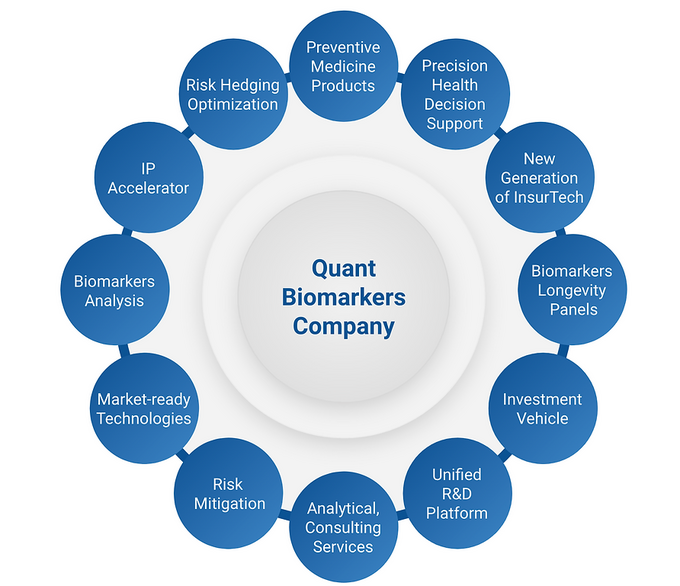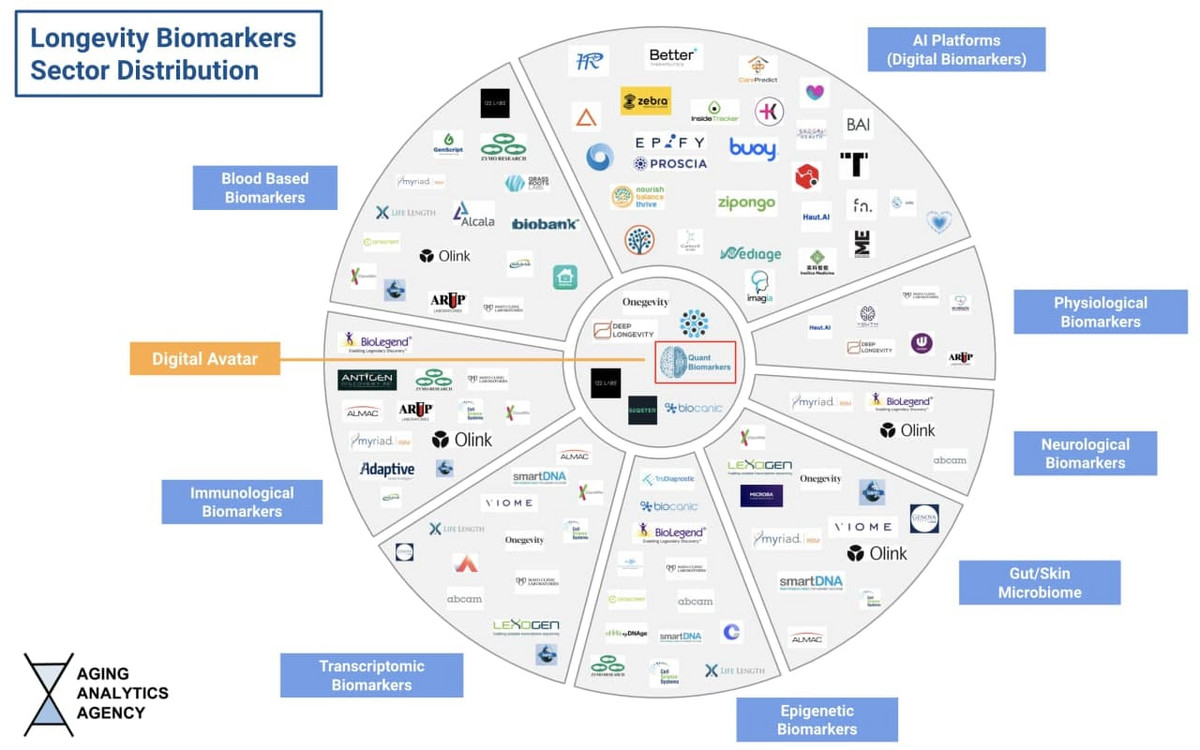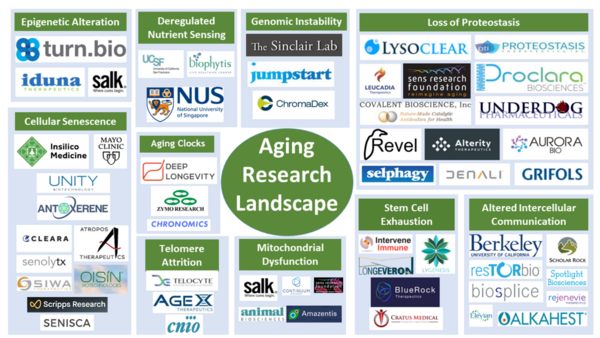Bringing “Everything on Demand” to Longevity Industry
Deep Knowledge Group, a UK-based consortium of commercial and non-for-profit companies in the domain of longevity industry and deep tech investments announced the launch of its Swiss-based subsidiary Quant Biomarkers. The new company is a data-driven biomedical analytical entity focused on biotechnology, Precision Longevity Medicine, novel InsurTech and financial instruments. Quant Bimarkers has the headquarters in Basel, Switzerland and branches in the United Kingdom and Germany.
Quant Biomarkers' primary mission is to advance biomarker technologies and support interventions in longevity medicine. The focus is on developing personalized biomarker panels for aging and oncology, as well as targeted endpoints for Hallmarks of Aging.
The company stated that beyond the wide scope of products and services, it will build a unique healthcare product -- a community driven web-application that will connect various sectors of the longevity industry together to offer a next-generation 360 check solution for health management and healthspan extension. This will be a unified platform using cutting-edge next-generation artificial intelligence (AI), deep learning and data-science driven technologies for the longevity industry.
Why is Quant Biomarkers' launch a notable event?
Today's unmet need is in integrated cross sector data and predictive analysis platforms for specific therapeutic areas in longevity. Integration of biomarkers of longevity with artificial intelligence (AI) and machine learning have the potential to help prevent age-related diseases and extend healthspan.
One of the primary goals of Quant Biomarkers' HealthTech, Practical Longevity, and Precision Medicine activities is to leverage AI-driven biomarkers’ assessment and analytics, integrated with modern business and financial solutions, to help close this complexity gap and accelerate the delivery of more modern, sophisticated Longevity medicines and diagnostics to patients and healthy individuals.
The Quant Biomarkers AI powered platform for real-time measurement of the Longevity biomarkers will predict human body functional capacity, presence of disease, help determine prognosis and will aim at implementing holistically the principals of “P4 Medicine”: Predictive, Preventive, Personalized, Participatory.
Biomarkers of biological age and the ongoing monitoring of small changes in health could help identify people who have a higher risk of developing diseases. Once somebody knows their individual risks, they can receive personalized preventive treatments -- in doses and timing optimized for their genetic profile, epigenetic peculiarities, and overall lifestyle.
Longevity Industry is a fairly new collective term describing intricately complex activities linking biomedicine, economy, healthcare, financial sub-sectors and pension system, “age tech” and geroscience, preventive medicine, insurance industry, and even government national strategies. The Longevity Industry emerged recently due to advances in aging research -- on the one hand, and a global increase in the number of elderly people putting tremendous pressure on healthcare systems and governments -- on the other hand. There is an expression “Silver Tsunami'' -- a metaphor used to express the overall increasing population age. In countries like the United States of America or Australia, senior citizens, 65 years or older, represent a good 15% of the total population. This trend creates unique challenges of the modern era -- health, social and economic implications.
RELATED: The Ageing Research Is On The Rise
As a multidimensional and intersectional industry, the Longevity Industry does not only present challenges, but also presents significant opportunities for a wide range of businesses.
However, considering a highly complex interplay of technologies, societal factors, and political nuances, understanding the Longevity Industry and developing risk management and growth strategies appears to be a challenging exercise for businesses and investors. Besides, from the practical healthcare point of view, the industry lacks infrastructure frameworks for effectively connecting the dots between consumers of the industry (those who are concerned with living longer and healthier), products and services providers, and information providers.
Another unique challenge of the Longevity Industry is its scientific component. In contrast to more traditional pharmaceutical industry, where therapies are usually developed to treat sick patient, and the progress of interventions can be monitored based on the analysis of very specific biomarkers, let’s say, blood pressure, or viral load -- the aging research requires a different set of metrics, associated with understanding so called biological age. Those kinds of biomarkers -- aging clocks, for instance -- are still not used in traditional clinical research, but they can be very useful already today for monitoring aging interventions or lifestyle choices in healthy populations. Aging biomarkers appear to play central role in the development of the Longevity Industry-- not only in terms of research on novel aging therapeutics and services, but in terms of making more general business and strategy decisions -- planning for new government programs, crafting more relevant insurance policies, and even de-risking investments into age-related biotech companies and service providers. Biomarkers of longevity appear to be the enabling technological aspect of managing longevity on a global scale.
Longevity Biomarkers at a Glance
Various biomarkers have long been used in the pharmaceutical clinical research and in medical practice for the purposes of drug discovery, diagnostics and treatment control. However, a majority of such biomarkers are irrelevant or insufficient when it comes to measuring results of longevity interventions, lifestyle choices, or application of aging therapeutics. Creation of longevity biomarker panels, and collecting data from healthy populations, including young people, is crucial to be able to create a global paradigm of preventive medicine. We can’t just rely on biomarkers of diseases, we need to be able to measure dynamical changes of bodily functions and state in healthy individuals who receive prophylactic longevity interventions. Powerful analytical systems are the key enabler for shifting towards such a paradigm, and the application of artificial intelligence-based systems is at the heart of this movement.
According to a report by Aging Analytics Agency, the commercially available biomarkers relevant for aging research fall into several key groups, including transcriptomics biomarkers, blood-based biomarkers, epigenetic biomarkers, immunological biomarkers, physiological biomarkers and neurological biomarkers -- the latter being of critical importance in the context of healthspan extension.
While there are hundreds of companies developing biomarkers and biomarker panels relevant to longevity industry, there are just a few companies -- including Deep Longevity, 122 Labs, Biocanic and others -- developing integrated platforms capable of capturing a wider picture of what is happening in the human body at any particular time, and in historical dynamics.
Quant Biomarkers, supported by industry experts in the pharmaceutical industry, finance, and capital markets, is taking the aim at solving some of the most pressing challenges of the Longevity Industry outlined above -- identifying the longevity biomarkers frameworks, and crafting strategies for incorporating such frameworks (or panels) into various aspects of business and society -- longevity R&D, investment de-risking, insurance and hedging objectives, and creating financial products and services to meet unique challenges of the “Silver Tsunami”.
The company will also serve as an incubator, intellectual property (IP)-accelerator, and investment vehicle for the Longevity Biomarkers sector, acquiring the most prospective startups, teams, and R&D facilities for the development of Longevity Preventive Medicine and Precision Health products as well as financial and analytical services.
The company will have a strong focus on building next-generation artificial intelligence (AI)-based systems to empower its activities with big data analytics. One of the first projects Quant Biomarkers is planning to introduce is a unified software-as-a-service platform for managing one’s personal longevity plan. The system will offer a dashboard, aka “control center”, which would be providing the ability to monitor one’s health status, assess lifestyle strategies, and connect to relevant longevity services and products to manage one’s healthspan and lifespan expectations. Effectively, Quant Biomarkers has the ambition to build the first (AI)-driven infrastructure to host the longevity ecosystem, bringing together multifaceted elements of this industry.
To learn more about Quant Biomarkers and to submit a request for consideration to become a longevity industry vendor for the integrated platform and marketplace, please, contact the company at sanja@dkv.global.
Topics: Biotech Companies


